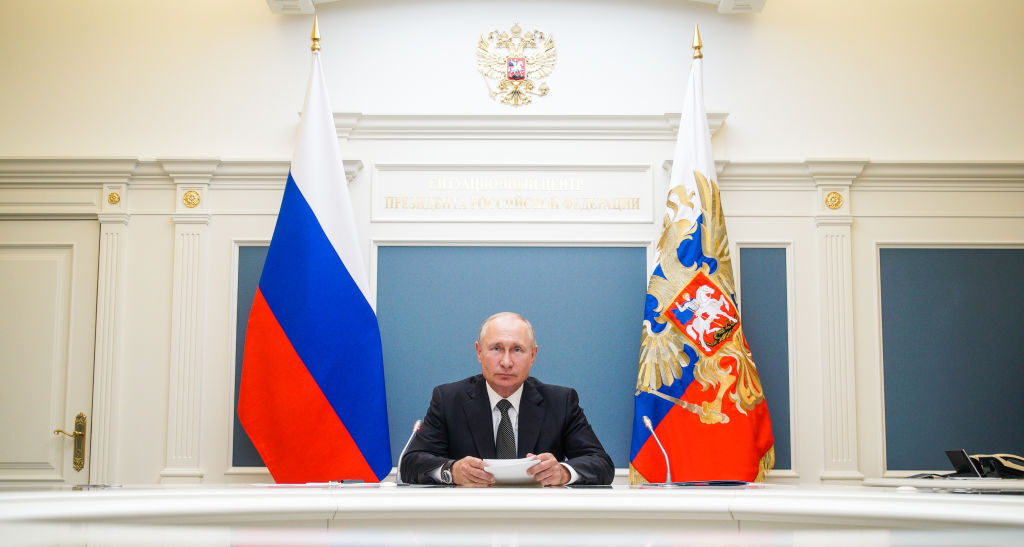Virtually every forecast, whether it concerns the war in Ukraine, the economic outlook, or the strength of far-Right parties, has a tendency to end up worse than expected. The one thing that is running better than expected is the Russian economy, with the country’s GDP growth currently outperforming Germany’s.
This is not a statement about the likely outcome of the war. Given enough Western support, Ukraine stands a good chance to regain some, if not most, of its Russian-occupied territories. But the Ukrainian counteroffensive, too, has been running below expectations so far. We can conclude, therefore, that there is something wrong with how we form expectations.
Mikhail Mishustin, the Russian Prime Minister, yesterday presented Vladimir Putin with an economic update, estimating that the economy will grow by 2% this year. Russian GDP caused a surprise by only going down 2% last year, following forecasts of a collapse of double-digit percentages. And so the aggregate effect of Western sanctions, the largest ever imposed on any country, has thus far been a minor and short-lived recession.
The 2% projection is at the upper end of forecasts, but not outrageously so. Reuters polled economists who came up with a consensus of 1.3%. The IMF has 0.7%. The Vienna Institute for International Economic Studies, which specialises in Central and Eastern Europe, put it at 1%.
These are astonishing numbers. When I wrote last year that the sanctions were failing to achieve their primary purpose of denting Putin’s war machine, I was told that the effect should be measured over a longer period. That is entirely fair: it’s the long-term effect that matters. Yet this is precisely where I would argue the sanctions are failing. Russia has succeeded in realigning its economy, evidently with the help of massive sanctions leaks through Central Asian republics, and with the assistance of China and India.
The German outlet FAZ quotes Vasily Astrov, a Russia expert at the Vienna Institute, citing two reasons for Russia’s economic resurgence. The first is the war economy, a classic Keynesian boom similar to what happened in the US and the UK during the Second World War. The second is the rise in real wages. This is in contrast to the West, where real wages are falling because of high inflation. In Russia, though, inflation is falling, from 14% at its peak last year to under 5%.
The argument in favour of sanctions was to make ordinary Russians worse off, so that Putin would lose domestic support. This has not happened, with private consumption now back at the 2021 level. A less benign factor behind the rise in real wages is acute labour shortages due to the draft.
Russia’s biggest vulnerability going forward is liquidity, but this is not a question of do or die. The country has suffered a loss of oil and gas revenues, as well as an increase in cost this year. This will result in a budget deficit, which Russia estimates to be 2% of GDP. The Vienna Institute, meanwhile, is forecasting 3.5%. In the last year, forecasts and commentators have claimed that Putin will literally run out of money by next year. This is not going to happen, as these forecasts are based on unrealistic scenarios, such as a total oil and gas embargo. Excessively optimistic military forecasts follow a similar trend, based as they are on unrealistic extrapolations about the level of Western support.
The economic situation in Ukraine remains dire, unsurprisingly, and most of the other Eastern European countries are currently registering the beginning of a recession. Since many of them are dependent on the German economy, the recession there is dragging them down.
Evidently, then, the combination of the Ukraine war and the resulting sanctions constitute a fairly symmetrical economic shock to both Europe and Russia. That is not what was expected. Policymakers would be well-advised to remember that economic sanctions are a powerful tool, one which should be handled with care. It is worth asking whether those making decisions, in the White House and the European Commission, know what they are doing.
This is an edited version of an article which originally appeared in the Eurointelligence newsletter











Join the discussion
Join like minded readers that support our journalism by becoming a paid subscriber
To join the discussion in the comments, become a paid subscriber.
Join like minded readers that support our journalism, read unlimited articles and enjoy other subscriber-only benefits.
Subscribe